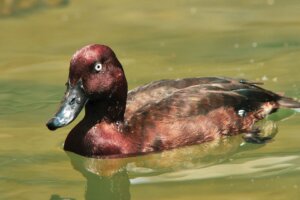How to Take Care of Baby Madagascar Pochards: Essential Guide
Taking care of baby Madagascar pochards can be challenging. These rare ducks need special attention to thrive.
Baby Madagascar pochards are one of the world’s rarest birds. With only a few left in the wild, proper care is crucial. These tiny ducklings need specific conditions to grow healthy. By understanding their needs, you can help these precious birds survive.
In this guide, we will explore the essential steps to care for baby Madagascar pochards. From their diet to their habitat, each detail matters. Let’s dive into the world of these unique birds and learn how to give them the best start in life.

Credit: www.theguardian.com
Preparing The Habitat
Creating a safe and comfortable habitat is essential for baby Madagascar Pochards. These ducks need a nurturing environment to thrive and grow. Let’s explore how to prepare the habitat effectively.
Choosing The Right Enclosure
Selecting the appropriate enclosure is crucial. The enclosure should be spacious and secure. It should protect the baby ducks from predators and harsh weather conditions.
Consider the following factors:
- Size: Ensure the enclosure is large enough for movement.
- Material: Use durable materials like wire mesh.
- Safety: Check for any sharp edges or gaps that might harm the ducks.
Place the enclosure in a quiet area. Avoid high-traffic zones. This reduces stress for the baby ducks.
Setting Up The Environment
Setting up the environment inside the enclosure is just as important. Provide a mix of dry and wet areas. Baby Madagascar Pochards love water, so a small pond or water dish is essential.
Here’s a simple setup guide:
| Feature | Description |
|---|---|
| Water Source | Provide a shallow pond or water dish. |
| Dry Area | Ensure there is a dry, warm area for resting. |
| Vegetation | Add some plants for cover and comfort. |
| Nesting Area | Create a soft nesting area with straw or hay. |
Maintain a clean environment. Clean the water source regularly. Remove any waste daily to keep the habitat hygienic.
Monitor the temperature inside the enclosure. Baby Madagascar Pochards need a warm environment. Use heat lamps if necessary.
By choosing the right enclosure and setting up a suitable environment, you ensure the well-being of your baby Madagascar Pochards.
Feeding Requirements
Feeding requirements are crucial for baby Madagascar Pochards. These rare ducklings need a specific diet and strict feeding schedule to grow healthy. Proper nutrition ensures they thrive and develop properly.
Diet Essentials
Baby Madagascar Pochards primarily eat insects and small aquatic creatures. Their diet must be high in protein for optimal growth. You can provide live insects like mealworms and small aquatic invertebrates. Ensure their food is fresh and clean to avoid health issues. Occasionally, offer small amounts of plant material for a balanced diet.
Feeding Schedule
Establish a consistent feeding schedule for baby Madagascar Pochards. Feed them small meals several times a day. Younger ducklings may need feeding every two hours. As they grow, gradually reduce the frequency. Always observe their eating habits and adjust portions as necessary. Fresh water should be available at all times to keep them hydrated.
Health And Wellness
Ensuring the health and wellness of your baby Madagascar Pochards is crucial. These rare ducks need special attention to thrive. Being proactive can prevent many issues. Below, we discuss common health problems and the importance of regular check-ups.
Common Health Issues
Baby Madagascar Pochards can face several health challenges. Respiratory infections are common. Watch for signs like sneezing or wheezing. Diarrhea can also be a problem. It often results from poor diet or dirty water. Another issue is leg deformities. These can occur if the ducklings do not get enough vitamins.
Parasites are another concern. They can affect the ducks’ feathers and skin. Regular cleaning helps prevent this. Be alert for any unusual behavior. It can be an early sign of illness. Quick action can save your duckling’s life.
Regular Check-ups
Regular check-ups are vital for baby Madagascar Pochards. A vet can spot problems before they get serious. Schedule visits at least once a month. The vet will check the duckling’s weight and overall health. They can also advise on diet and care.
Keep a close eye on your ducklings between visits. Note any changes in their behavior or eating habits. These can be early signs of health issues. Regular check-ups and vigilance ensure your baby Madagascar Pochards stay healthy and happy.

Credit: www.ebay.com
Socialization And Enrichment
Taking care of baby Madagascar pochards involves more than just feeding and sheltering. Socialization and enrichment play a vital role in their development. These aspects help them grow into healthy and well-adjusted birds. Let’s explore some key tips and activities for better socialization and enrichment.
Interaction Tips
Interacting with baby Madagascar pochards is essential for their mental and emotional well-being. Follow these tips to ensure positive interactions:
- Consistent Routine: Maintain a regular feeding and play schedule.
- Gentle Handling: Use soft movements to avoid startling them.
- Observation: Spend time watching their behavior to understand their needs.
- Patience: Give them time to get used to your presence.
Toys And Activities
Providing toys and activities keeps baby Madagascar pochards engaged and stimulated. Here are some suggestions:
| Toy | Description |
|---|---|
| Floating Toys | Soft and safe toys that float on water. |
| Foraging Boxes | Boxes filled with treats and safe materials to explore. |
| Mirror | A small mirror to keep them entertained. |
Incorporate these activities into their daily routine:
- Water Play: Allow them to swim in shallow water.
- Exploration Time: Let them explore safe areas under supervision.
- Interactive Games: Play simple games to stimulate their minds.
By following these guidelines, you can ensure your baby Madagascar pochards receive proper socialization and enrichment, leading to a healthy and happy life.

Credit: www.amazon.com
Frequently Asked Questions
What Do Baby Madagascar Pochards Eat?
Baby Madagascar Pochards primarily eat insects and small invertebrates. You can supplement their diet with specialized waterfowl feed. Ensure the food is small enough for them to swallow easily.
How Often Should I Feed Baby Madagascar Pochards?
Feed baby Madagascar Pochards three to four times daily. Ensure they have constant access to clean water. Monitor their eating habits to adjust portions as needed.
How To Keep Baby Madagascar Pochards Warm?
Use a heat lamp to maintain a temperature of 90-95°F for baby Madagascar Pochards. Gradually reduce the temperature as they grow older.
What Kind Of Habitat Do They Need?
Baby Madagascar Pochards need a clean, safe water source and a warm, dry shelter. Provide plenty of space for swimming and exploring.
Conclusion
Caring for baby Madagascar pochards takes dedication and patience. Keep their habitat clean. Provide fresh food and water daily. Monitor their health closely. Seek professional help if needed. Consistency ensures their well-being. Enjoy the rewarding experience of raising these unique birds.
Hello Dear, I'm Poli Kolymnia, owner of many birds (including budgies).
With a deep passion for these feathered companions, I'm here to share my expertise and extensive knowledge on birds care.
My articles cover essential topics like diet, housing, care, and health, providing practical tips to help you create a happy and thriving environment for your birds.





